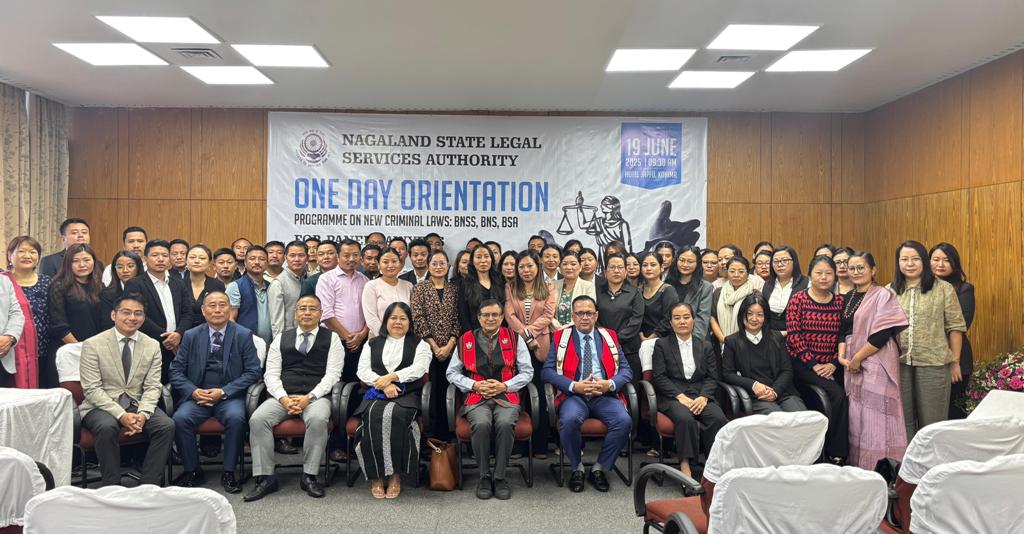Justice Y Longkumer of Gauhati High Court, Kohima Bench, on Thursday asserted that panel lawyers serve as vital educators, advisors, and counsellors.
Published on Jun 19, 2025
By EMN
Share

DIMAPUR — Justice Y Longkumer of Gauhati High Court, Kohima Bench, on Thursday asserted that panel lawyers, as primary access points for marginalised communities, serve as vital educators, advisors, and counsellors amid the Indian legal system's transition to new criminal laws.
Longkumer was addressing a one-day orientation programme on the new criminal laws — Bharatiya Nyaya Sanhita (BNS), Bharatiya Nagarik Suraksha Sanhita (BNSS) and Bharatiya Sakshya Adhiniyam (BSA) — for retainer lawyers/panel lawyers and legal aid defence counsel system (LADCS) lawyers, organised by the Nagaland State Legal Services Authority at Hotel Japfü, Kohima.
Also read: Series of DA-JGUA outreach camps held in Nagaland villages and towns
The judge noted that India's criminal justice system is undergoing major reforms with the introduction of BNS, BNSS, and BSA, replacing IPC, CrPC, and IEA, requiring the legal fraternity to adapt and learn.
“These new legislative reforms are not just mere cosmetic changes but represent a new way of thinking how justice system is perceived, delivered and experienced by the common citizens,” Longkumer said.
She emphasised that panel lawyers, as the primary access point for marginalised communities, play a crucial role in ensuring justice, making their role more vital than ever.
“You have to learn to adapt to changes with professionalism and as it is with any legal transition, there will be challenges and uncertainties in the interpretation,” the judge said.
She called for deeper engagement with law, greater professional development and renewed commitment to justice.
She also highlighted practical challenges, citing differing interpretations and sources, and the burden of unlearning old laws (IPC, CrPC) to adapt to new ones, requiring a mindset shift.
“But that is also an immense opportunity to refine their practice to lead with clarity and ensure that justice becomes more sensible, humane and aligned with constitutional values,” Longkumer underscored.
She maintained that laws evolve over time, but the lawyer's duty to uphold justice and protect individual rights remains constant, regardless of background.
The judge encourage lawyers to familiarise themselves with the BNS, noting its reclassification of offenses, introduction of new sentencing guidelines, and incorporation of community service as a punishment.
Additionally, she highlighted the importance of understanding enhanced victim compensation provisions, investigation timelines under BNSS, and modernised evidence rules, particularly regarding digital evidence.
Further, Longkumer asserted that panel lawyers now serve as educators, advisors, and counsellors, beyond just courtroom advocates, and stressed the need for a strong grasp of the new laws.
“Your clients cannot afford to be confused and delay must be avoided as far as the duties and responsibilities in the legal system are concerned,” she added.
Earlier, NSLSA member secretary Neiko Akami welcomed participants, stating that the training aimed to empower lawyers to deliver effective legal aid to various societal sections."
The programme was chaired by NSLSA retainer lawyer, Apila Sangtam.
Resource person Nasim Akhtar, faculty at Judicial Academy, Assam, covered major BNSS reforms, including new definitions, FIRs, complaints, investigation, arrest, bail, search, seizure, and property disposal. Meanwhile, SP Moitra, faculty at Judicial Academy, Assam, discussed changes in cognisance, trial, plea bargaining, sentencing, victim compensation, and witness protection under BNSS.